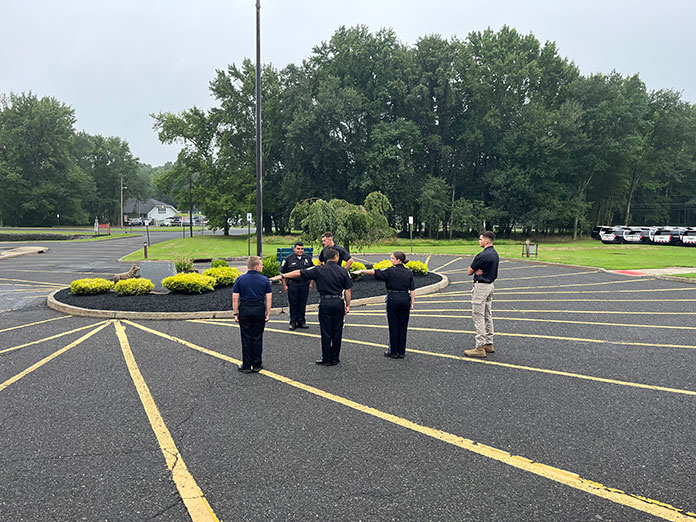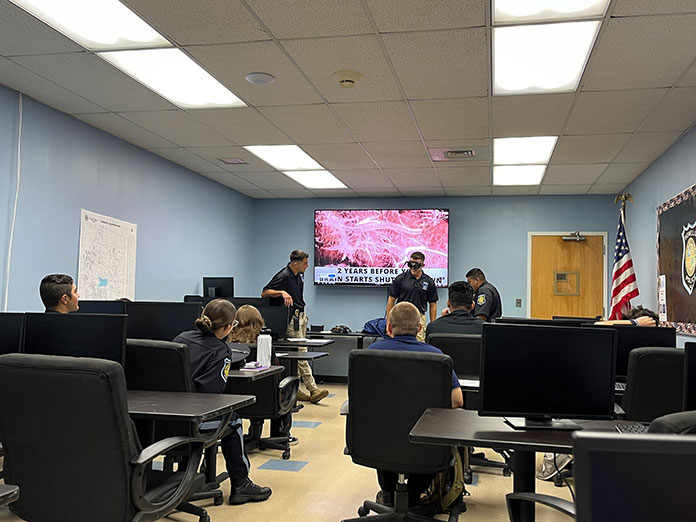
HOWELL – Following many of Howell Township’s community wide events, traffic jams and overcrowded parking lots can be found in desperate need of organization. On Howell Day, one of the biggest days for the township, cars and vehicles make turns and stops and the direction of a 15-year-old boy in a policeman’s uniform.
The 15-year-old boy is Jabri, a Howell Township High School freshman working his first event as a cadet in the Howell Public Safety Cadet program.
Along with Jabri, there are many children ages 14 to 21 getting a jump start on their careers with this program, run by the Howell Township Police Department.
The program, which is open for applicants all year long, provides a learning experience for what it is like to be a police officer, including lessons of morality, responsibility and community.
Meetings are held for current and aspiring cadets in the Howell Police Department on the second and fourth Thursday of every month. Here, they are given training and lessons exactly like those taught to adult officers in the district.
“The things that we show them are the exact same training that we get. Everything that we are teaching them are exactly the tactics that we use,” said Joseph Sulewski, a Howell Policeman and one of the program’s advisors.
Jabri, now 17 years old and in his second year of the program, reflects on his time on Howell Day as one of his favorite memories as a cadet. Along with Howell Day, cadets assist officers on National Day Out and Oktoberfest as well.
But it was not a fast road for Jabri to reach his status as a seasoned cadet. Before achieving full-time cadet status, children in the program are required to attend 12 meetings to show their dedication to the craft. After the first six meetings, they achieve probationary cadet status, and after the following six they are full-time cadets.
After completing all of these meetings, the full-time cadet reward lies beyond the official badges worn on their chests.

“It feels good to be able to be out in the community, get to know the community and be able to help protect the community,” Jabri said. “I like to help a lot of people.”
Even after achieving full-time cadet status, students in the program continue to attend meetings and learn from Officer Sulewski and their other advisors. Another full-time cadet, a 16-year-old girl named Alyssa, strongly values the lessons she learns as a cadet.
“I’m already getting my feet wet and getting an understanding of what to expect, which will be helpful to my future,” she said. “My favorite part is learning about what to expect when you become a police officer.”
Like Alyssa said, the program gives children a very clear idea of what it is like in the field of law enforcement. Many advisors for the program and police officers were members of the program as children themselves.
According to Officer Sulewski, who was enrolled in the program from ages 14 to 21, he knew of at least seven cadets in his class who went on to be police officers, four of which serving in Howell.
Because there is no set timeframe for children to be enrolled in the program, students can be enrolled for as little or as much time as they would like, as long as they are within the age limit. The experience also requires little financial obligations from cadets or their guardians, with a monthly dues of $10 to help pay for the cadets’ uniforms.
The department strongly suggests the program for any children with an interest in law enforcement and are always looking to recruit more participants.
“We want to teach the kids discipline. If a career in law enforcement is something they’re interested in, we want to give them an insight to that,” said Sulewski. “This way they know exactly what they’re getting into, and show them the various things we do as police officers, getting them exposed to as much as we can in a safe manner.”







